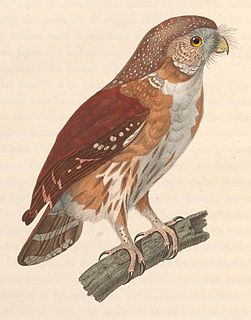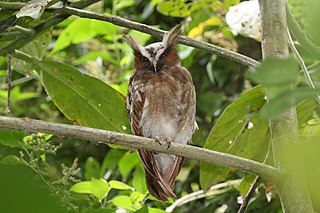
The ferruginous pygmy owl is a small owl that breeds in south-central Arizona and southern Texas in the United States, south through Mexico and Central America, to South America into Brazil, Bolivia, Paraguay and Argentina.

Pygmy owls are members of the genus Glaucidium. They belong to the typical owl family, Strigidae. The genus consists of 29 species distributed worldwide. These are mostly small owls, and some of the species are called "owlets". Most pygmy owl species are nocturnal and they mainly hunt large insects and other small prey.

The white-throated screech owl is a small owl found in the Andes of Bolivia, Colombia, Ecuador, Peru and Venezuela.

The Amazonian pygmy owl, also known as Hardy’s pygmy owl, is an owl found in northern South America and the Amazon Basin. A member of the Strigidae family, it is a true owl.

The rufous-banded owl is a species of owl in the family Strigidae. It is found in Bolivia, Colombia, Ecuador, Peru, and Venezuela.

The Yungas pygmy owl, is a species of owl in the family Strigidae. It is found in Argentina, Bolivia, and Peru.

The Central American pygmy owl is a species of owl in the family Strigidae. It is found in Belize, Colombia, Costa Rica, Ecuador, Guatemala, Honduras, Mexico, Nicaragua, and Panama.

The Andean pygmy owl is a species of owl in the family Strigidae. It is found in Colombia, Ecuador, Peru, and Venezuela.

The East Brazilian pygmy owl, also known as least pygmy-owl or Sick's pygmy-owl, is a small owl in the typical owl family.

The austral pygmy owl is a species of owl in the family Strigidae. It is found in Argentina and Chile.

The cloud-forest pygmy owl is a short, muscular, small-sized species of owl found throughout the Andes of western Colombia and north-western Ecuador, being confined to cloud forests between 900–2000 m a.s.l. Below this altitudinal range the Central American pygmy owl occurs; above it, the Andean pygmy owl occurs.

The Colima pygmy owl is a species of owl in the family Strigidae. It is endemic to the western part of Mexico.

The Pacific pygmy owl or Peruvian pygmy owl is a diurnal species of owl in the family Strigidae. It is found in Ecuador and Peru year round and its natural habitats are subtropical or tropical dry shrubland, subtropical or tropical moist shrubland, subtropical or tropical high-altitude shrubland, and heavily degraded former forest.

The Cuban pygmy owl is a species of owl in the family Strigidae that is endemic to Cuba.

The crested owl is a species of owl in the family Strigidae. It is the only species (monotypic) in the genus Lophostrix. It is a resident bird and occurs in Central America and northern South America. It is a medium-sized owl, easily recognizable with its very long whitish ear tufts and otherwise darker appearance. It inhabits lowland rainforests and prefers old growth in proximity with water. The crested owl is a strictly nocturnal species, but very little is known about its behaviour.

The rufescent screech owl is a species of owl in the family Strigidae. It is found in Bolivia, Colombia, Ecuador, Peru, and Venezuela.

The cinnamon screech owl is a species of owl in the family Strigidae. It is found in the Andes of Ecuador and Peru and possibly Colombia.

The West Peruvian screech owl or Peruvian screech owl is a species of owl in the family Strigidae. It is found in Ecuador and Peru.

The pale-footed swallow is a species of bird in the family Hirundinidae. It is found in the northern Andes, from Venezuela to Bolivia. It is monotypic.

The Pernambuco pygmy owl is a species of owl in the family Strigidae. This species, first described in 2002, is endemic to Pernambuco state in Brazil.






















